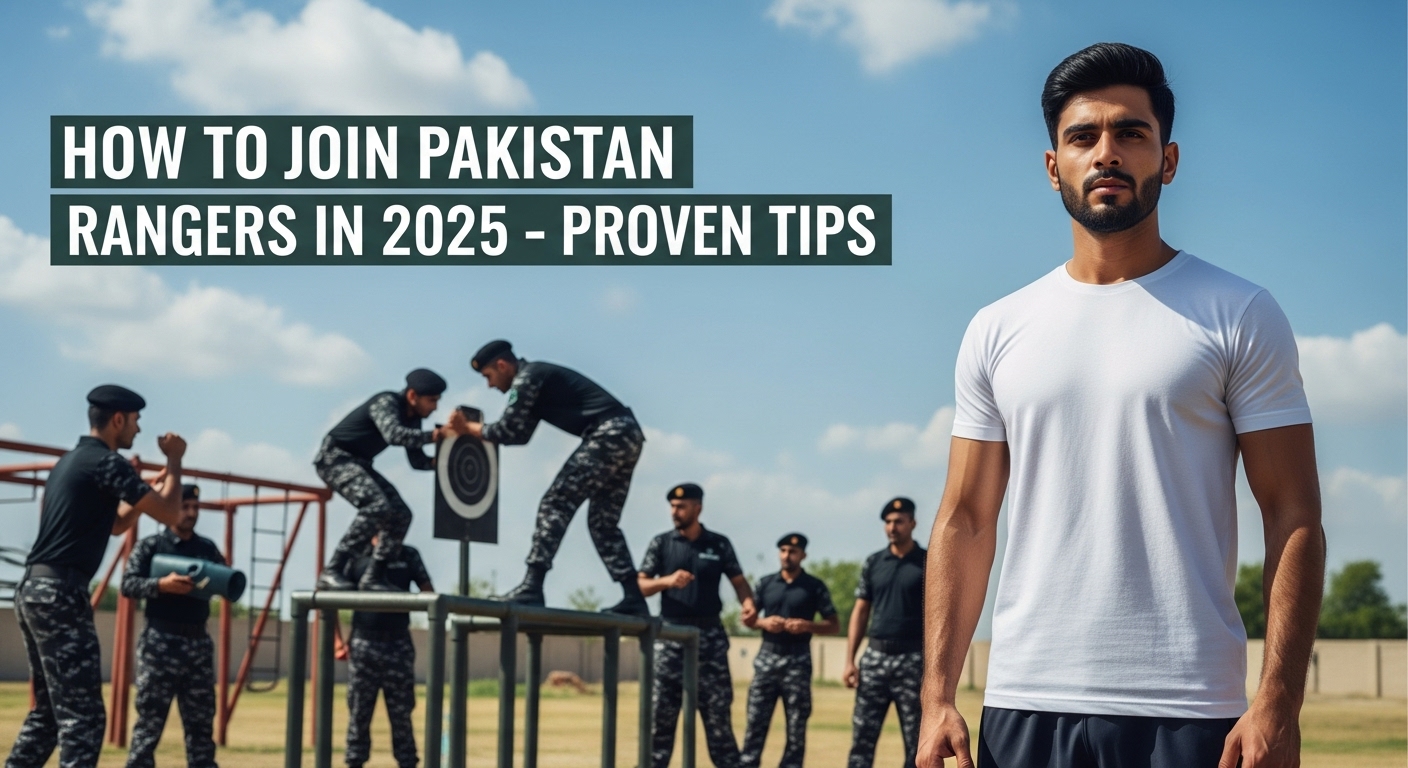Becoming a part of the Pakistan Rangers, whether in Punjab or Sindh, involves more than simply meeting a few basic qualifications. It is a carefully structured process with clear steps, each serving as a filter to ensure only the most suitable candidates are selected. The journey starts with confirming your eligibility, including your age, educational background, physical standards, and provincial domicile. Whether you are applying for a Sub Inspector position or aiming to join as a General Duty Sepoy, you must match your qualifications and interests with the specific requirements of the post.
It’s also vital to prepare all necessary documentation in advance. This typically includes your CNIC, domicile certificate, original and attested copies of educational qualifications, photographs, and in some cases, certificates for specialized training or experience. For both Punjab and Sindh Rangers, the application process may involve either online submission or reporting directly to recruitment centers. Following the guidelines precisely, whether through a website form or SMS registration, is crucial for progressing beyond this stage.
Once the application is submitted and preliminarily accepted, candidates move on to the physical and medical evaluation phase. This step is where preparation really counts. Height, chest size, and weight are measured against strict criteria, followed by endurance and strength-based exercises such as timed running, push-ups, and other drills. This phase ensures that candidates possess the physical capacity to meet the demands of active duty.
Those who meet the physical standards then undergo a full medical examination to rule out any health conditions that could interfere with service. Clearing these hurdles means you’re invited to sit for the written test, which evaluates your knowledge in a range of subjects, including general awareness, Pakistan studies, current affairs, mathematics, and basic English. It is advisable to prepare thoroughly using online tools, past exam papers, and test guides. The written test is more than just an academic filter. It’s designed to assess your mental sharpness, clarity of thought, and capacity to absorb the training that lies ahead.
After successfully completing the written exam, you’ll be shortlisted for an interview. This is the stage where your communication skills, motivation, and personality are evaluated in person. The panel seeks candidates who not only fit the role physically and intellectually but also mentally and emotionally.
A strong interview can significantly influence your final ranking in the merit list. If selected, the final leg of the journey is your formal induction into the Rangers through comprehensive training. This training is physically and mentally demanding, focusing on combat readiness, law enforcement skills, discipline, and strategic coordination. It usually takes place at designated training centers such as the one in Mandi Bahauddin for Punjab Rangers.
Upon successful completion, you receive your official posting, uniform, and begin your career as part of one of Pakistan’s most respected paramilitary forces. Throughout this process, staying disciplined, honest, and well-prepared is your best shot at securing a place within the Pakistan Rangers.
Step 1: Understand the Pakistan Rangers and Their Roles
Before you embark on the recruitment journey, it’s crucial to understand what the Pakistan Rangers are, their responsibilities, and the nature of their work.
What Are Pakistan Rangers?
- Pakistan Rangers are a paramilitary force under the Ministry of Interior.
- They primarily operate in Punjab and Sindh provinces, divided into Punjab Rangers and Sindh Rangers.
- Their main duties include:
- Border security (especially along the India-Pakistan border).
- Maintaining internal law and order.
- Assisting police in counter-terrorism and anti-crime operations.
- Protecting vital installations and government properties.
- Participating in disaster relief and emergency response.
Why Join Pakistan Rangers?
- It is a prestigious force with a strong sense of discipline and patriotism.
- Offers a stable government job with benefits such as pension, medical facilities, and housing.
- Provides opportunities for career growth, specialized training, and skill development.
- Allows you to serve your country in a critical security role.
Key Takeaway:
Understanding the force’s role helps you align your motivation and prepare mentally for the challenges ahead.
Step 2: Check Eligibility Criteria
This is a critical step. If you do not meet the eligibility criteria, your application will be rejected outright.
Detailed Eligibility Requirements
Criteria | Sindh Rangers | |
Nationality | Pakistani citizen only | Pakistani citizen only |
Age Limit | Generally 18-30 years for general posts; age relaxations for ex-servicemen and specific roles | Same as Punjab Rangers, with some variation for trades and ex-servicemen |
Gender | Male and female (female recruitment limited and announced separately) | Same as Punjab Rangers |
Domicile | Must have Punjab domicile | Must have Sindh domicile |
Education | Varies by post (8th class to intermediate and above) | Same as Punjab Rangers |
Physical Standards | Height: Minimum 5’6” for officers, 5’4” for sepoys; Chest: 33.75” with expansion for officers | Similar physical standards |
Medical Fitness | Must be medically fit, no chronic diseases | Same as Punjab Rangers |
Detailed Explanation:
Age Relaxation | Candidates with military or paramilitary experience may get age relaxation up to 35 or 45 years, depending on the post. |
Domicile Importance | This is strictly enforced. For example, a Sindh domicile is mandatory for Sindh Rangers recruitment. |
Physical Requirements | These are non-negotiable. Height and chest measurements are taken seriously to ensure candidates can handle the physical demands of the job. |
Educational Qualifications | For officer-level posts like Sub Inspector, an intermediate (FA/FSc) certificate is usually required. For general duty (GD) sepoys, a minimum of 8th class pass is sufficient. |
Tips:
- Double-check your CNIC and domicile certificates to ensure they are valid and up-to-date.
- If you are borderline on age, check if you qualify for any relaxation categories.
- Prepare your original educational documents and attested copies well in advance.
Step 3: Choose the Post You Want to Apply For
Pakistan Rangers recruit for a variety of posts. Each post has specific eligibility criteria, responsibilities, and career paths.
Common Posts and Their Requirements
Post | Education | Age Limit | Physical Standards |
Sub Inspector (SI) | FA/FSc or equivalent | 20-35 years | Height 5’6”, Chest 33.75” |
Religious Teacher | Matric + Fazil | 20-35 years | Same as SI |
Havildar/Naik GD | Matric | Up to 40 years | Height 5’4”, Chest 33” |
Sepoy GD | Minimum 8th class | 18-30 years | Height 5’4”, Chest 33” |
Trades (Cook, Tailor, Waiter, etc.) | 8th class or relevant experience | Varies | Varies |
How to Choose?
- Assess your educational background and physical fitness honestly.
- Consider your career goals and interests.
- Review the job descriptions carefully to understand daily duties.
Step 4: Prepare Required Documents
Having all your documents ready and organized is essential to avoid delays or rejection.
List of Required Documents
CNIC / B-Form | Must be original and valid. |
Domicile Certificate | Issued by the relevant provincial authority. |
Educational Certificates | Original and attested copies of all degrees or diplomas. |
Photographs | Usually 4 recent passport-sized photos with a white background. |
Character Certificate | Sometimes required, issued by a gazetted officer or local authority. |
Medical Fitness Certificate | May be required during physical tests. |
Service Certificates | For ex-servicemen, discharge papers or service record. |
Fee Receipt | Proof of payment for application fee, if applicable. |
Tips for Document Preparation
- Get multiple attested copies of your certificates.
- Ensure your photographs meet the required specifications.
- Keep documents in a neat folder, organized by type.
- Verify the validity of your CNIC and domicile before applying.
Step 5: Application Process
Punjab Rangers Application Process |
|
Sindh Rangers Application Process |
|
Important Notes
- Always apply through official channels to avoid scams.
- Application forms must be filled out accurately; mistakes can lead to disqualification.
- Keep track of application deadlines and do not delay submission.
- Step 6: Physical and Medical Tests
Step 6: Physical Test Components
Physical Test Requirements |
|
Medical Examination |
|
Preparation Tips
- Start physical training weeks or months before the test.
- Practice running, push-ups, and sit-ups daily.
- Maintain a healthy diet and get adequate rest.
- Avoid smoking or any habits that reduce fitness.
- Attend the test with proper sportswear and water.
Step 7: Written Test
The written examination tests your intellectual and general knowledge capabilities.
Subjects Covered |
|
Test Format |
|
Preparation Tips
- Use past papers and sample tests available online.
- Read newspapers daily to stay updated on current affairs.
- Review textbooks for Pakistan studies and Islamic studies.
- Practice English grammar and vocabulary exercises.
- Solve basic math problems regularly.
Step 8: Interview and Final Selection
Interview Process |
|
Final Selection |
|
Tips for Interview
- Dress neatly and professionally.
- Be honest and confident.
- Prepare answers for common questions.
- Show awareness of current security issues and the role of Rangers.
- Demonstrate discipline and respect.
Step 9: Training
Training Academy |
|
Training Duration |
|
What to Expect |
|
Step 10: Joining and Service
After Training |
|
Career Growth |
|
Common Issues and How to Troubleshoot Them
1. Eligibility Verification Issues
|
|
2. Application Submission Problems
|
|
3. Physical Test Failures
|
|
4. Medical Examination Issues
|
|
5. Written Test Challenges
|
|
6. Interview Difficulties
|
|
7. Training Challenges
|
|









